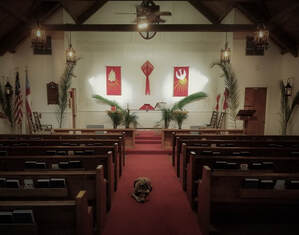YOU WILL BE WELCOMED!
Never been to an Episcopal Church before?

That's ok! The Episcopal Church is sometimes called the "middle way" because we fall somewhere between Protestant and Roman Catholic in our Liturgy. Here is what to expect for your first virtual visit to St. Peter's. Whether you are passing through, feeling God's call, or searching for guidance and answers, you belong here at St. Peter's. Please feel comfortable and at home. We welcome all; seriously! Notice our church dog, Girly, in the aisle.
Expansive Language Services
On certain Saint Days throughout the year, St. Peter's uses expansive language. In these services, we still follow Holy Eucharist Rite 2 from the Book of Common Prayer, however you will notice that the language is more inclusive.
Expansive Language Services
On certain Saint Days throughout the year, St. Peter's uses expansive language. In these services, we still follow Holy Eucharist Rite 2 from the Book of Common Prayer, however you will notice that the language is more inclusive.
Here are some of our core beliefs
The Baptismal Covenant
The rite of Christian initiation contains a series of vows, made by all present, called the "baptismal covenant" (BCP, pp. 304-305). After the candidates have renounced evil and committed themselves to Christ, the presider asks the congregation to join them and "renew our own baptismal covenant." Responding to a series of questions, the people affirm belief in the triune God (through the Apostles' Creed) and promise to continue in the Christian fellowship, resist evil and repent, proclaim the gospel, serve Christ in all persons, and strive for justice and peace. The Book of Common Prayer (BCP) also suggests the covenant for use, in place of the Nicene Creed, on four days when there are no candidates for baptism: the Easter Vigil, the Day of Pentecost, All Saints' Day or the Sunday thereafter, and the feast of the Baptism of our Lord. In the Episcopal Church the baptismal covenant is widely regarded as the normative statement of what it means to follow Christ.
The Bible
It is our foundation, understood through tradition and reason, containing all things necessary for salvation. Our worship is filled with Scripture from beginning to end.
The Book of Common Prayer
The Book of Common Prayer is a treasure chest full of devotional and teaching resources for individuals and congregations, but it is also the primary symbol of our unity. We, who are many and diverse, come together in Christ through our worship, our common prayer.
The Creeds
We will always have questions, but in the two foundational statements of faith – the Apostles’ Creed used at baptism, and the Nicene Creed used at communion – we join Christians throughout the ages in affirming our faith in the one God who created us, redeemed us, and sanctifies us.
The Five Marks of Mission
The Mission of the Church Is the Mission of Christ
The rite of Christian initiation contains a series of vows, made by all present, called the "baptismal covenant" (BCP, pp. 304-305). After the candidates have renounced evil and committed themselves to Christ, the presider asks the congregation to join them and "renew our own baptismal covenant." Responding to a series of questions, the people affirm belief in the triune God (through the Apostles' Creed) and promise to continue in the Christian fellowship, resist evil and repent, proclaim the gospel, serve Christ in all persons, and strive for justice and peace. The Book of Common Prayer (BCP) also suggests the covenant for use, in place of the Nicene Creed, on four days when there are no candidates for baptism: the Easter Vigil, the Day of Pentecost, All Saints' Day or the Sunday thereafter, and the feast of the Baptism of our Lord. In the Episcopal Church the baptismal covenant is widely regarded as the normative statement of what it means to follow Christ.
The Bible
It is our foundation, understood through tradition and reason, containing all things necessary for salvation. Our worship is filled with Scripture from beginning to end.
The Book of Common Prayer
The Book of Common Prayer is a treasure chest full of devotional and teaching resources for individuals and congregations, but it is also the primary symbol of our unity. We, who are many and diverse, come together in Christ through our worship, our common prayer.
The Creeds
We will always have questions, but in the two foundational statements of faith – the Apostles’ Creed used at baptism, and the Nicene Creed used at communion – we join Christians throughout the ages in affirming our faith in the one God who created us, redeemed us, and sanctifies us.
The Five Marks of Mission
The Mission of the Church Is the Mission of Christ
- To proclaim the Good News of the Kingdom
- To teach, baptize and nurture new believers
- To respond to human need by loving service
- To seek to transform unjust structures of society, to challenge violence of every kind and to pursue peace and reconciliation
- To strive to safeguard the integrity of creation and sustain and renew the life of the earth